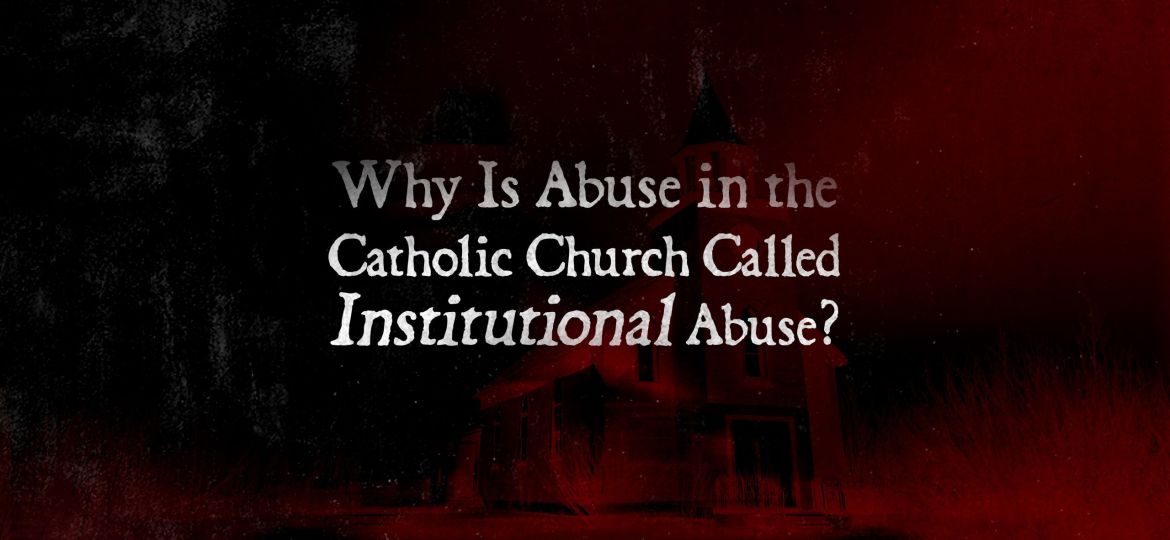Why Is Abuse in the Catholic Church Called Institutional Abuse?
When an organization is accused of abuse, that organization may use its vast resources to cover up the allegations, belittle the survivor, and silence critics. This pattern has been labelled as institutional abuse.
Understanding institutional abuse is imperative to knowing the extent of the Catholic Church’s abuse. With institutional organizations, there are many avenues in which a person in power may attempt to abuse a survivor, as there are often strict hierarchies.
Although many organizations are at risk of committing institutional abuse, very few have the strict hierarchy and prominence of the Catholic Church.
What is Institutional Abuse?
Institutional abuse is a malleable concept, but the phrase usually refers to the mistreatment of an individual by a trusted organization. This can result in many different forms, such as:
- Patterns of Power Imbalance: This form of institutional abuse can only be seen over time and multiple incidents. Patterns of power imbalance are often seen in organizations that have a clear “pecking order” of roles, and that order can lead to the mistreatment of those on the lower rungs of the ladder.
- Organizational Neglect: This is a unique form of institutional abuse in the sense that organizational neglect is often not intentional. This form is usually the result of an organization stretching itself too thin or overloading itself with work. When an organization exceeds its capacity, this can result in overworked employees or extremely long waiting periods for clients.
- Cover-Ups: Cover-ups are the form of institutional abuse that Jeff Anderson & Associates are most familiar with. When an institution is made aware of an allegation of abuse against them, that institution will wish to silence the allegations as soon as possible in order to maintain its position of trust. The Catholic Church is notorious for this form of abuse, as many priests and bishops have attempted to discard survivors in a refusal to investigate itself fairly.
- Stalling in Redress: A form of institutional abuse that The Catholic Church often employs is using legal tactics to stall or prevent accepting responsibility for abuses. One of the most common loopholes that is exploited is declaring Chapter 11 bankruptcy, which you can read about more here.
These abuses can result in long-lasting effects on survivors ranging from feeling underappreciated to severe trust issues for the rest of their lives.
Although there are many reasons to be hesitant in trusting an organization after an institutional abuse is uncovered, there are many ways to provide support in moving forward.
Why do Organizations Commit Institutional Abuse?
There are many reasons that an organization may resort to institutional abuse.
- Reputation: Reputation is a strong incentive for an organization to commit institutional abuse. For The Catholic Church, reputation is a core tenet in their continued relevance. People come to the Church for safety and consolation, and if people stopped viewing the Church as safe, they would likely stop attending.
- Finances: Another reason for institutional abuse is that an organization may fear the financial repercussions of admitting abuse and how it would be able to continue functioning if paying out settlements.
- Religion: Specific to religious organizations, forgiveness of the perpetrator of abuse may outweigh the wish for justice for certain members of the upper echelons of the hierarchy.
Why Is Abuse in the Catholic Church Called Institutional Abuse?
The basic answer to this question is that The Catholic Church is an institution, however its ties to institutional abuse go much further than that. The Catholic Church is at an extremely high risk of committing institutional abuse because it has so much to lose by admitting wrongdoing. The Church has been seen as a place of solace and safety for thousands of years, and any attempt to shatter that view will be met with the full force of the Church because that is its foundation. Cover-ups, neglect, power imbalance, and many other abuses have been utilized by the Church in defense of its reputation.
Take the First Step with a Free Legal Consultation with Jeff Anderson & Associates
If you believe that you were a victim of institutional abuse or know of a cover-up by The Catholic Church, please contact us for a confidential legal consultation.


